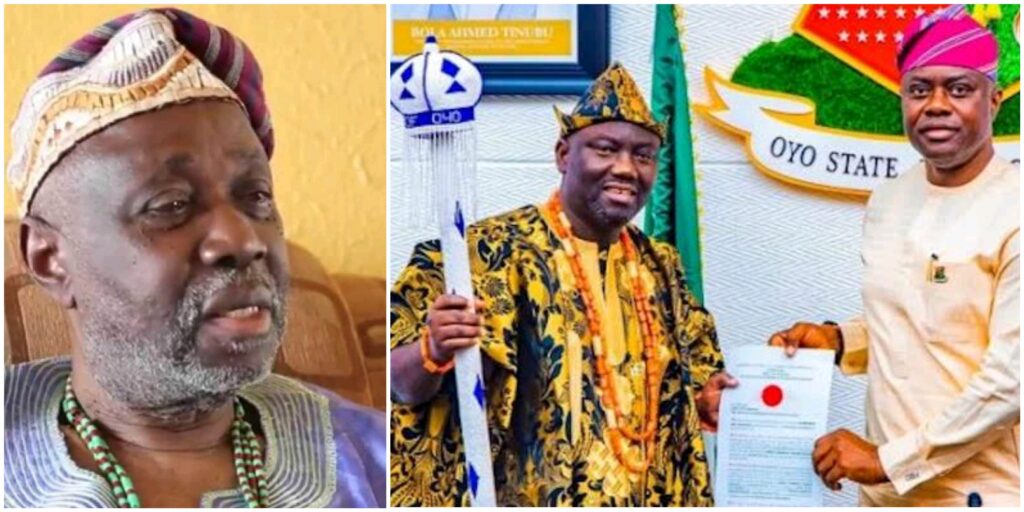- An Ifa divination priest delved into the profound spiritual process that culminated in the selection of Abimbola Akeem Owoade as the new Alaafin of Oyo, highlighting the sacred and meticulous nature of the decision.
- The announcement, backed by Governor Seyi Makinde, has ignited fierce controversy, with some members of the Oyo Mesi vocally opposing the outcome, claiming Owoade was not their chosen candidate
- The Ifa Priest defending the integrity of the process, revealed that the Oyo Mesi were not mere observers but active participants in the Ifa consultation.
Professor Wande Abimbola, renowned scholar of Yoruba culture, former Vice Chancellor of Obafemi Awolowo University (OAU), and the esteemed Awise Awo Agbaye (Spokesperson of Ifa Worldwide), has provided a detailed and spiritually rich account of how Abimbola Akeem Owoade emerged as the new Alaafin of Oyo.
Speaking in an exclusive interview with the Nigerian Tribune, the Ifa Priest, Prof. Abimbola revealed the pivotal role of Ifa divination in the selection process, which came nearly three years after the passing of Oba Lamidi Adeyemi III, the revered Alaafin whose legacy still casts a long shadow over the ancient Yoruba kingdom.
Governor Seyi Makinde formally approved Owoade’s appointment on January 10, marked the end of a protracted wait for a successor to the throne.
However, the announcement was not without its share of controversy. Some members of the Oyo Mesi—the traditional council of kingmakers entrusted with selecting a new Alaafin—have openly disputed Owoade’s emergence, claiming he was not their chosen candidate.
In response to the controversy, Prof. Abimbola offered an unflinching defense of the spiritual rigor and cultural authenticity that guided the selection. He disclosed that Ifa, the sacred oracle of the Yoruba people, was consulted at every stage of the process.
Prof. Abimbola emphasized that the Oyo Mesi members were present and actively participated in these consultations, underscoring the legitimacy of the process.
The Ifa Priest who also served as the Majority Leader in Nigeria’s Third Republic Senate, did not shy away from addressing allegations of corruption leveled against some members of the Oyo Mesi. These accusations, he suggested, could explain the internal divisions that have marred the traditional council’s deliberations.
He condemned any attempts to undermine the sanctity of the selection process through personal interests or political interference, warning that such actions could jeopardize the spiritual and cultural foundation of Yoruba leadership.
His words: “Now, it is not the case that the kingmakers were bypassed; they were there while we consulted Ifa to choose the best. The Oyo Mesi were there only they had split into two. And one section took the governor to court; that he must take the candidate they presented. There were five kingmakers. They used to be seven. Two of them had died, remaining five.
“Two of the five (Oyo Mesis) went to government to complain that from the bribe that was given to them, what they gave to them was small. So, the EFCC invited all of them and they confessed: “Well, we are very sorry that we are involved in this. This is the money that we got. Please, forgive us.
“But the others, instead of that, took the government to court, saying that the candidate that they chose through the influence of money must be installed. The case is still in court. So, the two kingmakers who relented were part of the process.
“The governor also picked another two as warrant chiefs in the process of selecting the Alaafin. Which is the normal way it is done. If things are like this and the kingmakers split, if they don’t agree among themselves, they would use warrant chiefs; they (government) find other minor kings or chiefs in the town and they make them warrant chiefs to participate.
“You can’t use somebody who took the government to court anymore. In any case, those ones are adamant on their own choice which the government didn’t want to use. So, it’s not that the choice of Ifa was not acted upon by the kingmakers. They (four of them) were there and they agreed. It’s the kingmakers who chose the person selected by Ifa.”
